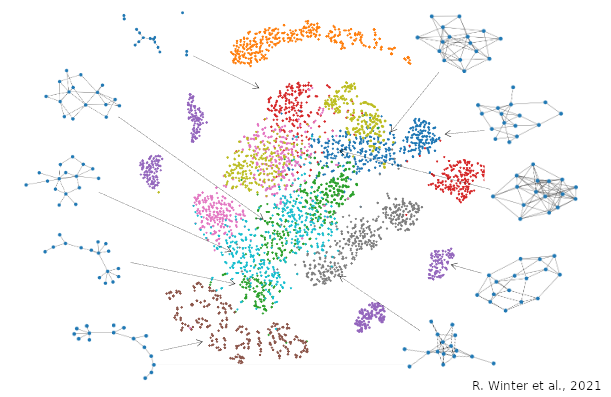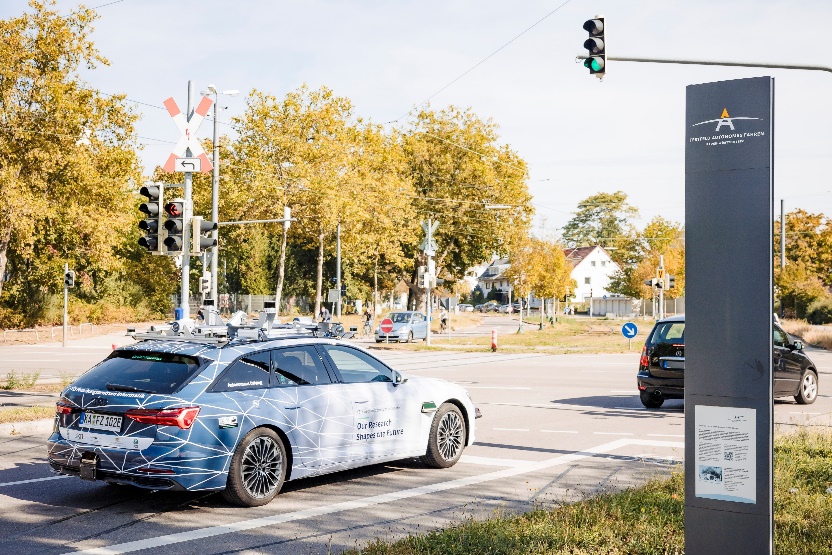Comparison of GNN-based methods for similarity learning on heterogeneous, attributed graphs
- Subject:Comparison of GNN-based methods for similarity learning on heterogeneous, attributed graphs
- Type:Masterarbeit
- Date:ab sofort
- Supervisor:
- Add on:
Offen

Graphs are a flexible and universally applicable data model used in various domains, ranging from molecular biology chemistry and medicine to social network analysis and recommendation systems to autonomous driving and robotics. In our research, we use graph representations to model and analyze traffic scenarios.
In particular, we are interested in clustering and classifying such according to their semantic similarity. Given recent advances in the subfield of Graph Neural Networks (GNN), various self- and unsupervised deep learning techniques might be leveraged for similarity learning on heterogeneous, spatio-temporal traffic scenario graphs. Specifically, we are interested in examining and comparing the following different methodologies and approaches with regard to their suitability for graph-level clustering:
-
Graph autoencoders [1, 2, 3]
-
Contrastive learning / Siamese networks [6, 7]
-
Bootstrapping-based approaches [4]
-
Graph matching networks (GMN) [5]
Moreover, these GNN-based approaches shall be compared to more traditional methods, involving such based on graph edit distance (GED) and other graph kernel methods [8].
Structure
-
Literature research and exploration of the current state-of-the-art in graph representation- and similarity learning, graph clustering and graph kernel methods
-
Evaluation of existing methods and application to complex traffic scenario graphs
-
Improvement and extension of existing methods to the specific domain of scenario-based testing in AD
-
Benchmark, quantitative and qualitative evaluation of different approaches
The primary focus of this thesis could be either placed on conducting a quantitative comparison of existing methods (possibly requiring their implementation first) or on developing and optimizing a custom approach in extension to the current state of the art.
Literature
-
[1] C. Wang, S. Pan, G. Long, X. Zhu, and J. Jiang, “MGAE: Marginalized Graph Autoencoder for Graph Clustering,” in Proceedings of the 2017 ACM on Conference on Information and Knowledge Management, 2017.
-
[2] R. Winter, F. Noe, and D.-A. Clevert, “Permutation-Invariant Variational Autoencoder for Graph-Level Representation Learning,” presented at the Advances in Neural Information Processing Systems, 2021.
-
[3] C. Yang, P. Zhuang, W. Shi, A. Luu, and P. Li, “Conditional Structure Generation through Graph Variational Generative Adversarial Nets,” in Advances in Neural Information Processing Systems, 2024.
-
[4] S. Thakoor et al., “Large-Scale Representation Learning on Graphs via Bootstrapping,” arXiv.org, 2023.
-
[5] Y. Li, C. Gu, T. Dullien, O. Vinyals, and P. Kohli, “Graph Matching Networks for Learning the Similarity of Graph Structured Objects,” in Proceedings of the 36th International Conference on Machine Learning, 2019.
-
[6] W. Ju et al., “GLCC: A General Framework for Graph-Level Clustering,” Proceedings of the AAAI Conference on Artificial Intelligence, 2023.
-
[7] M. Zipfl, M. Jarosch, and J. M. Zöllner, “Traffic Scene Similarity: a Graph-based Contrastive Learning Approach,” presented at the ITSC, 2023.
-
[8] N. M. Kriege, F. D. Johansson, and C. Morris, “A survey on graph kernels,” Springer International Publishing, 2020.
Preferred skills
-
Solid foundations in the field machine learning, specifically deep learning
-
Preferably basic knowledge of Graph Neural Networks
-
Hands-on experience with Python and frameworks like PyTorch and / or TensorFlow
-
Willingness to acquire new technical knowledge, read and understand scientific papers and work independently
-
Fluent in German and / or English
Required documents
-
Brief cover letter (3-4 sentences)
-
Brief CV (max. 2 pages)
-
Your current grades (Notenauszug)
Send your application to muetsch ∂does-not-exist.kit edu.

